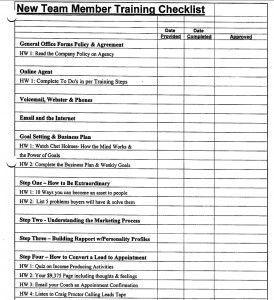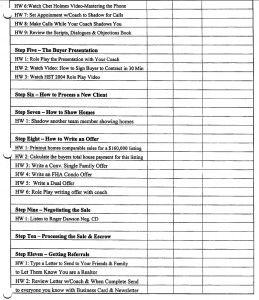I started my real estate brokerage way back in 2000 because I realized I wanted to build a business that could be ultimately sold. At some point in the years before starting this new company, I realized selling homes as a one-man real estate agent didn’t provide any future equity. Selling homes as a one-man business could provide an attractive income, but not much else. By not building a real business, I was leaving a great deal of money on the table.
Why not sell homes and build an amazing business with equity at the same time?
So I got my broker’s license and started my own company. I really had no idea how I was going to build this company. I didn’t have any new agent training plans like the larger brokerages in my area did. My original plan was to recruit existing agents away from other companies. I figured this approach would eliminate the need for a training program assuming these agents were already trained. Well, this assumption wasn’t correct and recruiting existing agents was a lot more challenging than I thought it would be.
After trying this for a year or so, I finally realized the best approach was to focus on brand new agents. When I would see someone I thought would be a good agent, I would approach them and encourage them to get their real estate license. I would pay for their licensing and would train them from the ground up. This presented a problem because I didn’t have a training program for brand new agents. So I decided to have them shadow me with all of my appointments. This way, I could leverage my time dramatically and build the business at the same time. Having new agents shadow you is a GREAT strategy because they get to see how you handle various situations (presentations, showings, negotiations, objections, etc.)
However, I soon began to realize that these new agents needed more training, so I spent a weekend creating a “New Team Member Training Checklist.” I’ve included my original training program for you below. Please understand this training checklist is from the early 2000s and may be a little outdated! This program evolved over the years; however, this was the basis for the entire program.
(Click on the image to enlarge!)
This training program was tweaked and improved regularly. The end result was that my full time agents were averaging 6 to 8 home sales each month when I sold my business. Yes, I was very good at generating and converting leads for them, but they still had to turn these clients into $$$ and they did an awesome job. The training program and great direct response marketing led to an amazing team selling close to 300 homes a year.
Here are a few key things you may want to take away for your business:
1. You do not have to be the one who handles every aspect of the training. At first, I had a limiting belief that made me think I had to handle everything in their training. This was a problem because I didn’t have a lot of extra time. I was incredibly busy writing advertisements, salesletters, newsletters, and working with my own clients. This thinking that I had to personally train new agents was NOT correct and actually held me back for many months. If you review each item in my checklist, you’ll see I finally starting leveraging things that helped me increase my personal home sales. What books, videos, training courses, audio recordings helped you to become a better salesperson? Have all new agents on your team use these as part of your training program. Leverage what helped you and you’ll compound your sales increase through every new agent on your team.
2. Your training should include homework assignments. This is important because you want to weed out new agents who are lazy and who don’t follow through. This is a way to “test” them before investing too much time into their training. If a new agent isn’t doing their homework, they won’t follow-up with leads. They also won’t do what they say they’re going to do. Let them go and focus your time on new agents who WILL do the training homework assignments.
3. Have other team members help train new team members. On my original checklist, notice the three columns next to each item. These columns are “Date Provided”, “Date Completed”, and “Date Approved.” The columns were used by other people on my team to ensure the new person followed through on each training step. My administrative assistant could lead the new person through many steps in the process. In addition, I had other agents on my team help train new agents. You’ll see this in steps asking the new person to work with their “coach.” This coach was another agent on my team. New agents compounded as they began training other agents.
4. Make sure your training helps new agents overcome limiting beliefs. Over the years, I realized we all have various limiting beliefs. I have them. You have them. New agents on your team will have them, too. You should definitely have steps in your training designed to help your new agents let go of their limiting beliefs. Otherwise, they’ll struggle because their limiting beliefs will hold them back. You should notice several steps in my training included simply to get new people to “see” things differently.
5. Constantly improve your training program. Step thirteen asks the new person who just completed the training program how to improve the training for future team members. Their comments and feedback were used to improve the training going forward. This process continued each and every month.
I’m sharing all of this with you for a few reasons.
The first reason is I’m hoping you “see” you can build an amazing team with great agents simply by leveraging the things that helped you become a great agent. On a high-level, your training program should clone you. This is only accomplished by having new agents do what you did as part of your journey. Another lesson I’m hoping you extract is you can have other team members help you build your team. As they help train others, they’ll become better agents in the process. Sometimes we learn more by teaching than by doing.
Obviously, some of the items in my original training checklist are outdated. Don’t let this distract you. Think through what has helped you and use everything in your new agent training program!


